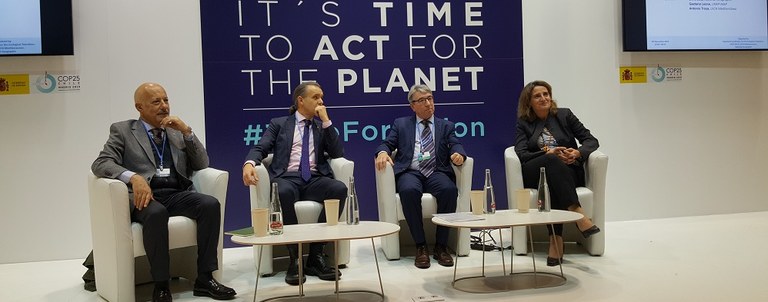THE MEDITERRANEAN IN THE GLOBAL SPOTLIGHT OF COP25, TWO DAYS AFTER THE CONCLUSION OF THE REGIONAL COP21 OF THE BARCELONA CONVENTION
Two days after the conclusion of COP21 of the Barcelona Convention and its Protocols (Naples, Italy, 2-5 December 2019), Mr Gaetano Leone, UNEP/MAP — Barcelona Convention Secretariat Coordinator participated in a discussion hosted by H.E. Ms. Teresa Ribera, Minister for the Ecological Transition of Spain, and entitled the “Mediterranean Sea and climate change”. The event took place on 9 December 2019 in the context of UNFCCC COP25 in Madrid, Spain.
Referring to the words emphasized by Minister Ribera, namely inclusion and ambition, Mr Leone described the importance of an integrated regional response to climate change. He argued that the MAP – Barcelona Convention system “provides an inclusive framework for regional cooperation to address the multiple challenges posed by climate change, particularly in mainstreaming adaptation into decision-making processes on coastal and marine spatial planning, biodiversity and natural capital, pollution reduction and conservation.”
The Coordinator underscored the three-pronged thrust of the Mediterranean Action Plan covering the institutional, regulatory and implementation aspects of the required climate action in the region.
On the institutional level, the MAP—Barcelona Convention system’s proven convening power, notwithstanding a regional setting fraught with disparities and an undercurrent of often tense geopolitical dynamics, comes with a consistent pattern of effective resource mobilization that continues to unlock significant funds from the GEF and other major international financial institutions.
Last week at COP21, the Contracting Parties to the Barcelona Convention and its Protocols adopted a roadmap for the proposal of a possible designation of the Mediterranean as an Emission Control Area for Sulphur Oxides, in line with the terms of Annex VI of the International Convention for the Prevention of Pollution from Ships (MARPOL). This important development illustrates the MAP-Barcelona Convention system’s ability to mobilize political commitment around an issue as complex as the abatement of emissions in the region.
On the regulatory level, the Mediterranean Action Plan’s legal framework encompasses several important elements of policy responses to climate change. One eloquent example is the legally-binding Integrated Coastal Zone Management Protocol that entered into force in 2011, which includes important aspects related to the strengthening of coastal resilience to climate hazards. The Regional Climate Change Adaptation Framework for the Marine and Coastal Areas (RCCA), which was devised under the impetus of MAP, provides the required strategic approach to increase the resilience of the region’s natural and socioeconomic systems.
Speaking on ambition, Mr Leone said that the MAP-Barcelona Convention system was working on several strategic directions in relation to climate change. He cited the establishment of MedECC, an open and independent international scientific expert network bringing together more than 600 scientists form 35 countries. MedECC is working to consolidate the knowledge base underpinning informed decision-making, and to strengthen the science-policy interface that is a crucial for the articulation of adequate responses to climate change.
On action on the ground -- and at sea--, the MAP-Barcelona Convention system implements projects that are gradually fine-tuning collective methodological approaches such as CLIMAGINE, a MAP methodology aimed at securing the effective participation of stakeholders in devising coastal area management programs. With the recently approved GEF-funded MedProgramme project on climate change and the relevant projects executed by the Regional Activity Centres, the system is contributing to a stronger regional capacity to respond to climate change.
“We will continue to foster partnerships for coastal resilience in the Mediterranean. Mobilizing resources is a central goal for the system, and options for large investments in the Mediterranean are being explored,” Mr Leone observed.
Organized by the General Directorate for the sustainability of the coast and the sea (MITECO) of Spain, the side-event in Madrid included interventions by IUCN Mediterranean and National Geographic.
--------------------------
Photo: From left to right: Mr Gaetano Leone (UNEP/MAP), Mr Enric Sala (National Geographic), Mr Antonio Troya (IUCN- Mediterranean), and H.E. Ms Teresa Ribera, Minister for the Ecological Transition (Spain).
Credits: Ministerio para la Transición Ecológica (Spain) / Itziar Martin Partida

